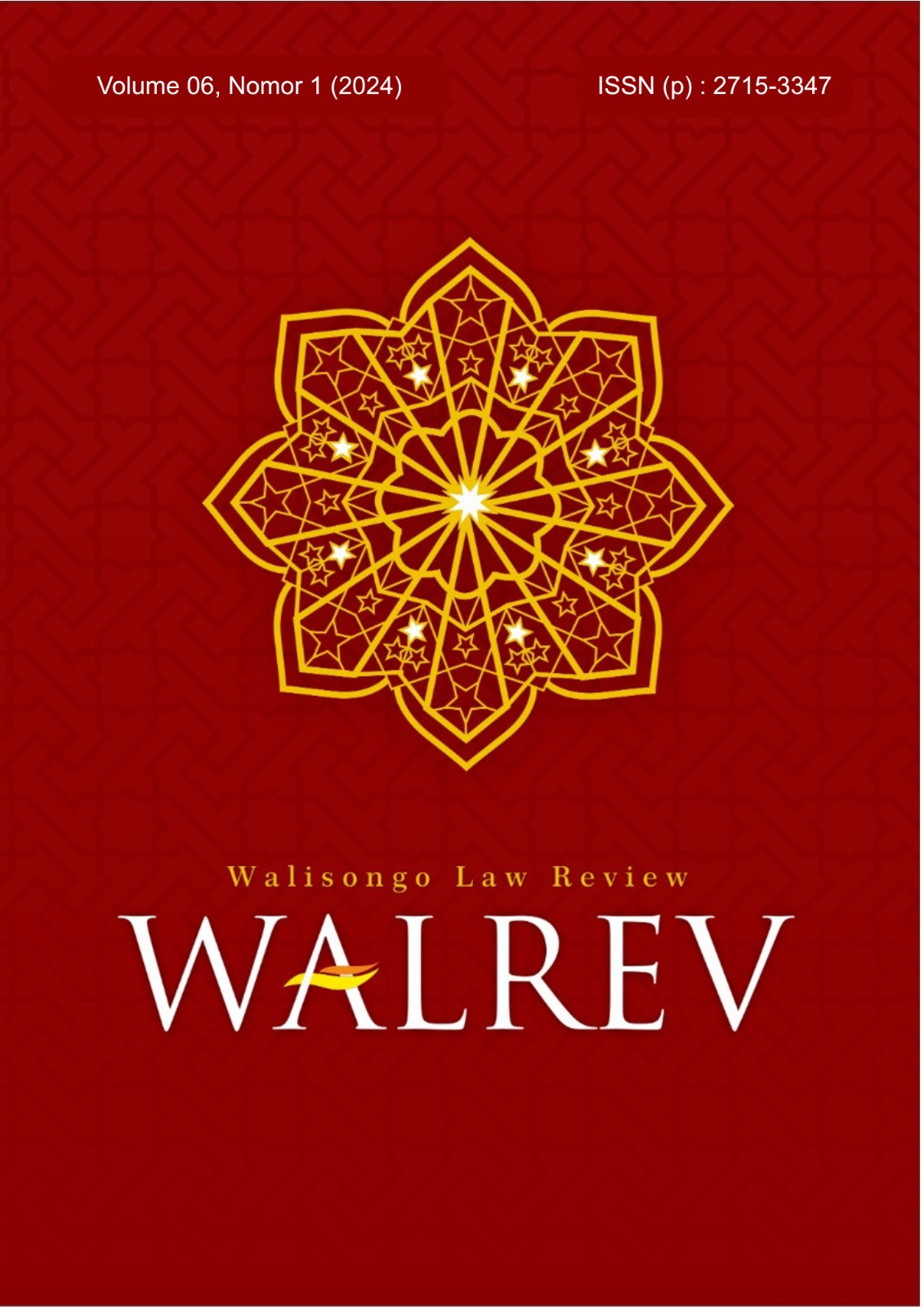Evaluating Global Cybersecurity Laws: Efectiveness of Legal Frameworks and Enforcement Mecanism in the Digital Age
DOI:
https://doi.org/10.21580/walrev.2024.6.1.20960Keywords:
Cyber security law, systematic literature review, regulation, cyber threatsAbstract
The background of this article highlights the escalating global cybersecurity threats in the digital era and underscores the urgent need to strengthen law enforcement through public–private partnerships (PPPs), as traditional legal frameworks struggle to address the complex and transnational nature of cybercrime effectively. This study examines the role of PPPs in enhancing cyber law enforcement across various legal systems. Using a systematic literature review methodology, the research evaluates the effectiveness of collaborative initiatives between the public and private sectors in combating cyber threats. The findings reveal that PPPs have significant potential to strengthen law enforcement efforts through technological innovation, information sharing, and operational cooperation. However, persistent challenges—such as limited transparency, trust deficits, and conflicting institutional interests—remain substantial barriers to their success. The study recommends that policymakers enhance legal frameworks, promote transparency, and develop capacity-building initiatives through joint training programs. Moreover, the research identifies critical gaps in the existing literature, emphasizing the need for more comprehensive empirical studies to better understand and address the complexities of cyber law enforcement through PPPs in the digital age.
Latar belakang artikel ini menyoroti meningkatnya ancaman keamanan siber secara global di era digital serta menegaskan urgensi penguatan penegakan hukum melalui kemitraan publik–swasta. Hal ini diperlukan karena kerangka hukum konvensional sering kali tidak mampu secara efektif menangani kompleksitas dan sifat lintas batas dari kejahatan siber. Penelitian ini bertujuan untuk mengkaji peran PPP dalam meningkatkan efektivitas penegakan hukum siber di berbagai sistem hukum. Dengan menggunakan metode systematic literature review, penelitian ini mengevaluasi efektivitas berbagai inisiatif kolaboratif antara sektor publik dan swasta dalam menghadapi ancaman siber. Hasil penelitian menunjukkan bahwa PPP memiliki potensi besar dalam memperkuat upaya penegakan hukum melalui inovasi teknologi, pertukaran informasi, dan kerja sama operasional. Namun demikian, sejumlah tantangan masih menghambat keberhasilannya, antara lain keterbatasan transparansi, defisit kepercayaan, dan konflik kepentingan antar lembaga. Penelitian ini merekomendasikan agar pembuat kebijakan memperkuat kerangka hukum, meningkatkan transparansi, serta mengembangkan program peningkatan kapasitas melalui pelatihan bersama. Selain itu, penelitian ini juga mengidentifikasi kesenjangan penting dalam literatur yang ada dan menekankan perlunya kajian empiris yang lebih komprehensif untuk memahami dan mengatasi kompleksitas penegakan hukum siber melalui PPP di era digital.
Keywords: Cyber Law, Cybersecurity, Public–Private Partnerships, Legal Frameworks, Enforcement Mechanisms.
Downloads
References
Abimbola Oluwatoyin Adegbite, Deborah Idowu Akinwolemiwa, Prisca Ugomma Uwaoma, Simon Kaggwa, Odunayo Josephine Akindote, and Samuel Onimisi Dawodu. 2023. “Review of Cybersecurity Strategies in Protecting National Infrastructure: Perspectives from the USA.” Computer Science & IT Research Journal 4(3):200–219. doi: 10.51594/csitrj.v4i3.658.
Ajayi, E. F. G. 2016. “Challenges to Enforcement of Cyber-Crimes Laws and Policy.” Journal of Internet and Information Systems 6(1):1–12. doi: 10.5897/JIIS2015.0089.
Atkins, Sean, and Chappell Lawson. 2021. “An Improvised Patchwork: Success and Failure in Cybersecurity Policy for Critical Infrastructure.” Public Administration Review 81(5):847–61. doi: 10.1111/puar.13322.
Brinkerhoff, Derick W., and Jennifer M. Brinkerhoff. 2011. “Public–Private Partnerships: Perspectives on Purposes, Publicness, and Good Governance.” Public Administration and Development 31(1):2–14. doi: 10.1002/pad.584.
Broadhurst, Roderic, and Yao-Chung Chang. 2012. “Cybercrime in Asia: Trends and Challenges.” SSRN Electronic Journal. doi: 10.2139/ssrn.2118322.
Bunga, Dewi. 2019. “Legal Response to Cybercrime in Global and National Dimensions.” PADJADJARAN Jurnal Ilmu Hukum (Journal of Law) 06(01):69–89. doi: 10.22304/pjih.v6n1.a4.
Carr, Madeline. 2016. “Public-Private Partnerships in National Cyber-Security Strategies.” International Affairs 92(1):43–62. doi: 10.1111/1468-2346.12504.
Croasdell, David, and Adonis Palustre. 2019. “Transnational Cooperation in Cybersecurity.”
Del-Real, Cristina, and Antonio M. Díaz-Fernández. 2022. “Understanding the Plural Landscape of Cybersecurity Governance in Spain: A Matter of Capital Exchange.” International Cybersecurity Law Review 3(2):313–43. doi: 10.1365/s43439-022-00069-4.
Didenko, Anton N. 2020. “Cybersecurity Regulation in the Financial Sector: Prospects of Legal Harmonization in the European Union and Beyond.” Uniform Law Review 25(1):125–67. doi: 10.1093/ulr/unaa006.
Hutchings, Alice, and Ben Collier. 2019. “Inside out: Characterising Cybercrimes Committed Inside and Outside the Workplace.” Pp. 481–90 in 2019 IEEE European Symposium on Security and Privacy Workshops (EuroS&PW). IEEE.
Kshetri, Nir. 2017. “Blockchain’s Roles in Strengthening Cybersecurity and Protecting Privacy.” Telecommunications Policy 41(10):1027–38. doi: 10.1016/j.telpol.2017.09.003.
Kshetri, Nir. 2019. “Cybercrime and Cybersecurity in Africa.” Journal of Global Information Technology Management 22(2):77–81. doi: 10.1080/1097198X.2019.1603527.
Luthfi, A. Hashbi. 2019. “Implementation of Technology Transfer Based on Law No. 25 of 2007 on Investment in the Context of Development of Industry in Indonesia.” Walisongo Law Review 2(2):141–56.
Manley, Max. 2015. “Cyberspace’s Dynamic Duo: Forging a Cybersecurity Public-Private Partnership.” Journal of Strategic Security 8(3Suppl):85–98. doi: 10.5038/1944-0472.8.3S.1478.
Nawawi, Jumriani, Darmawati Darmawati, Mulyadi Alrianto Tajuddin, and Briggs Samuel Mawunyo Nutakor. 2023. “The Law Enforcement Related to Cyber Crime by Involving the Role of the Cyber Patrol Society in Achieving Justice.” Jurnal IUS Kajian Hukum Dan Keadilan 11(3):437–47. doi: 10.29303/ius.v11i3.1289.
Nodeland, Brooke, and Scott Belshaw. 2020. “Establishing a Criminal Justice Cyber Lab to Develop and Enhance Professional and Educational Opportunities.” SECURITY AND PRIVACY 3(5). doi: 10.1002/spy2.123.
Olukunle Oladipupo Amoo, Akoh Atadoga, Temitayo Oluwaseun Abrahams, Oluwatoyin Ajoke Farayola, Femi Osasona, and Benjamin Samson Ayinla. 2024. “The Legal Landscape of Cybercrime: A Review of Contemporary Issues in the Criminal Justice System.” World Journal of Advanced Research and Reviews 21(2):205–17. doi: 10.30574/wjarr.2024.21.2.0438.
Paek, Seung Yeop, Mahesh K. Nalla, and Julak Lee. 2020. “Determinants of Police Officers’ Support for the Public-Private Partnerships (PPPs) in Policing Cyberspace.” Policing: An International Journal 43(5):877–92. doi: 10.1108/PIJPSM-06-2020-0088.
Rowe, Brenda I. 2020. “Transnational State-Sponsored Cyber Economic Espionage: A Legal Quagmire.” Security Journal 33(1):63–82. doi: 10.1057/s41284-019-00197-3.
Ruddin, Isra, and Subhan Zein SGN. 2024. “Evolution of Cybercrime Law in Legal Development in the Digital World.” Jurnal Multidisiplin Madani 4(1):168–73. doi: 10.55927/mudima.v4i1.7962.
Sadeghi, Ahmad, Peivand Bastani, and Omid Barati. 2020. “Identifying Barriers to Development of the Public-Private Partnership in Providing of Hospital Services in Iran:A Qualitative Study.” Evidence Based Health Policy, Management and Economics. doi: 10.18502/jebhpme.v4i3.4162.
Saleem, Hobashia, Junaid Jan, and Azzalfa Areej. 2022. “Cyber Crimes Trends in Pakistan: Analyzing the Legal Framework and Enforcement Challenges.” Society, Law and Policy Review 1(1):10–22. doi: 10.62585/slpr.v1i1.21.
Sarker, Sree Pradip Kumer, and Raza Zahir Khan. 2024. “Cybersecurity Considerations for Smart Bangladesh: Challenges and Solutions.” Asian Journal of Research in Computer Science 17(6):145–56. doi: 10.9734/ajrcos/2024/v17i6464.
Shawe, Robb, and Ian R. McAndrew. 2023. “Increasing Threats to United States of America Infrastructure Based on Cyber-Attacks.” Journal of Software Engineering and Applications 16(10):530–47. doi: 10.4236/jsea.2023.1610027.
Thielbörger, Pierre. 2016. “The International Law of the Use of Force and Transnational Organised Crime.” Pp. 361–80 in International Law and Transnational Organised Crime. Oxford University Press.
Vendius, Trine Thygesen. 2015. “Europol’s Cybercrime Centre (EC3), Its Agreements with Third Parties and the Growing Role of Law Enforcement on the European Security Scene.” European Journal of Policing Studies 3(2):151–61. doi: 10.5553/EJPS/2034760X2015003002005.
Younies, Hassan, and Tareq Na’el Al-Tawil. 2020. “Effect of Cybercrime Laws on Protecting Citizens and Businesses in the United Arab Emirates (UAE).” Journal of Financial Crime 27(4):1089–1105. doi: 10.1108/JFC-04-2020-0055.
Downloads
Published
How to Cite
Issue
Section
License
Copyright (c) 2024 Muhammad Taufik Rusydi

This work is licensed under a Creative Commons Attribution-ShareAlike 4.0 International License.










